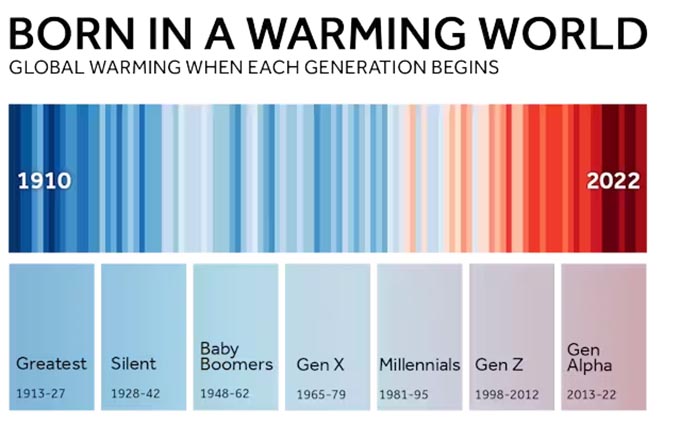
Studies at the global and national levels show that many young people from Generation Z (Gen Z) and Millennials are very concerned about environmental issues and climate change. Gen Z is a global population group born between 1998-2012, while Millennials were born between 1981-1995.
Their level of concern about the current state of the earth is higher than that of previous generations , such as Generation X (1965-1989) and Baby Boomers (1946-1964).
This condition gave birth to a very strong climate action from young people Gen Z and Millennials compared to older people . In fact, this action also triggered the birth of the meme “Ok Boomer” , as a satire by a number of young people against the older generation who are considered old-fashioned towards progressive steps, including climate action.
Unfortunately, this satire actually creates intergenerational sentiment and blame. The younger generation considers the older generation to have damaged the environment and exacerbated climate change . The older generation is also labeled as slow to address it.
Meanwhile, the older generation complains about young people who they consider to be “mentally soft” and only like to play with gadgets . They also often “order” the young to take action to take care of environmental issues .
@juliansewell she’s just a character…. #newzealand #kiwi #nz #nztiktok #climatechange #boomers #karen #fyp #viral ♬ original sound – Julian Sewell
Bringing generational sentiment into the climate change issue does not simplify the issue . Many factors end up being overlooked when looking at the root causes of the climate crisis and its impacts.
While satirical memes increase public exposure to environmental issues, these types of conversations can actually shift the public’s focus from how to address climate change.
Every generation needs more conversations about the impacts of climate change. By talking more, generations should empathize and dialogue to formulate joint actions, as soon as possible.
Which generation suffers the most?
Unpleasant events due to climate change, such as extreme heat, forest fires, tornadoes, floods, and powerful waves, have resulted in losses for many people in various countries and regions in Indonesia . However, experiences of events and disasters between generations are clearly different.
Gen Z, born between 1998 and 2012, grew up in a climate where the Earth’s temperature was at least 0.5°C warmer than the Baby Boomers, born between 1948 and 1962. This difference is also felt especially by Generation Alpha, born between 2013 and 2022.

Earth’s temperature rise chart over generations. (Climate Central)
These two generations, including Millennials born between 1981-1995, are the groups that will feel the most impact of climate change in the future. If all countries in the world are serious and ambitious in reducing climate change (including eliminating coal burning), they will live most of their lives amidst a 1.5-2.4°C increase in Earth’s temperature.
The hotter the Earth’s temperature, the more severe the misfortunes that befall humans will be. This can have an impact on both physical and mental health .
Meanwhile, with the same scenario, the Baby Boomers generation feels a temperature increase of 1.9°C . Because the majority are elderly, Boomers are more vulnerable to the impacts of climate change in the near future such as scorching heat, forest fires, landslides, and extreme rain.
In developing countries like Indonesia, the situation can have a more concerning effect. For example, the older generation who are farmers , from Generation X to Boomers, are exposed to extreme heat in the fields and weather uncertainty. This has an impact on their health as well as their livelihood.
Baby Boomer fishermen in coastal villages in Sumbawa, for example, are not to blame for climate change. Instead, they are victims.
In another case, there was a young man who was proven to have accepted bribes from an environmentally destructive company that was making the Earth even more miserable.
Intergenerational empathy
The dire situation the Earth is in should make us spend less time blaming each other. Instead, every generation needs to realize that climate change impacts everyone—no matter what age they are.
Older generations like Baby Boomers and Gen X need to understand that younger generations, especially Gen Z and Gen Alpha, grew up in a worse Earth situation. In the future, the situation is threatened to get worse.
On the other hand, the younger generation also needs to acknowledge that the older generation is very vulnerable to the impacts of climate change. The elderly in developing countries, with lower life expectancies than in developed countries, are at risk of being affected by environmental damage many times over.
Because environmental problems are the responsibility of all humanity, intergenerational empathy is essential to spark collective discussions to reduce intergenerational “conflict” and strengthen each other to survive amidst a changing climate.
Intergenerational collaboration can also produce more effective and comprehensive solutions. Millennials and Gen Z can gain advice and seek experience from older generations to formulate targeted climate action. Meanwhile, Boomers and Gen X can take advantage of the fresh ideas of their next generation to help restore the damage that occurred during their productive years.
Intergenerational dialogue to understand each other and find solutions together has actually started in many places . Various regions in Indonesia, as a country that is vulnerable to various crises , need to start and get used to it from now on.
Author Bio: Diah Ayu Prawitasari works at the Islamic University of Indonesia (UII) Yogyakarta
